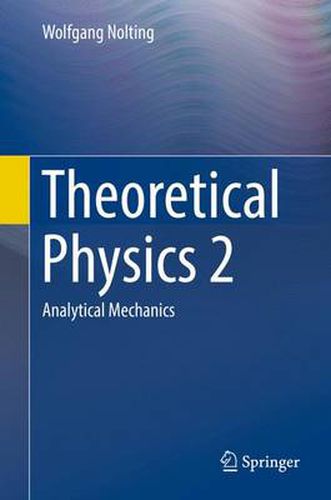Readings Newsletter
Become a Readings Member to make your shopping experience even easier.
Sign in or sign up for free!
You’re not far away from qualifying for FREE standard shipping within Australia
You’ve qualified for FREE standard shipping within Australia
The cart is loading…






This title is printed to order. This book may have been self-published. If so, we cannot guarantee the quality of the content. In the main most books will have gone through the editing process however some may not. We therefore suggest that you be aware of this before ordering this book. If in doubt check either the author or publisher’s details as we are unable to accept any returns unless they are faulty. Please contact us if you have any questions.
This textbook offers a clear and comprehensive introduction to analytical mechanics, one of the core components of undergraduate physics courses. The book starts with a thorough introduction into Lagrangian mechanics, detailing the d'Alembert principle, Hamilton’s principle and conservation laws. It continues with an in-depth explanation of Hamiltonian mechanics, illustrated by canonical and Legendre transformation, the generalization to quantum mechanics through Poisson brackets and all relevant variational principles. Finally, the Hamilton-Jacobi theory and the transition to wave mechanics are presented in detail. Ideally suited to undergraduate students with some grounding in classical mechanics, the book is enhanced throughout with learning features such as boxed inserts and chapter summaries, with key mathematical derivations highlighted to aid understanding. The text is supported by numerous worked examples and end of chapter problem sets. About the Theoretical Physics series Translated from the renowned and highly successful German editions, the eight volumes of this series cover the complete core curriculum of theoretical physics at undergraduate level. Each volume is self-contained and provides all the material necessary for the individual course topic. Numerous problems with detailed solutions support a deeper understanding. Wolfgang Nolting is famous for his refined didactical style and has been referred to as the German Feynman in reviews.
$9.00 standard shipping within Australia
FREE standard shipping within Australia for orders over $100.00
Express & International shipping calculated at checkout
This title is printed to order. This book may have been self-published. If so, we cannot guarantee the quality of the content. In the main most books will have gone through the editing process however some may not. We therefore suggest that you be aware of this before ordering this book. If in doubt check either the author or publisher’s details as we are unable to accept any returns unless they are faulty. Please contact us if you have any questions.
This textbook offers a clear and comprehensive introduction to analytical mechanics, one of the core components of undergraduate physics courses. The book starts with a thorough introduction into Lagrangian mechanics, detailing the d'Alembert principle, Hamilton’s principle and conservation laws. It continues with an in-depth explanation of Hamiltonian mechanics, illustrated by canonical and Legendre transformation, the generalization to quantum mechanics through Poisson brackets and all relevant variational principles. Finally, the Hamilton-Jacobi theory and the transition to wave mechanics are presented in detail. Ideally suited to undergraduate students with some grounding in classical mechanics, the book is enhanced throughout with learning features such as boxed inserts and chapter summaries, with key mathematical derivations highlighted to aid understanding. The text is supported by numerous worked examples and end of chapter problem sets. About the Theoretical Physics series Translated from the renowned and highly successful German editions, the eight volumes of this series cover the complete core curriculum of theoretical physics at undergraduate level. Each volume is self-contained and provides all the material necessary for the individual course topic. Numerous problems with detailed solutions support a deeper understanding. Wolfgang Nolting is famous for his refined didactical style and has been referred to as the German Feynman in reviews.